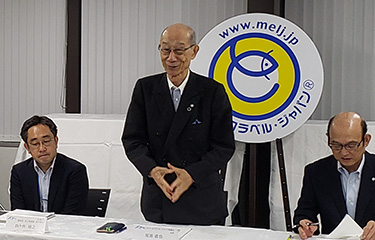After a year-long assessment process, Japan’s Marine Eco-Label (MEL) certification standard, which has recently become the primary standard for many of the country’s feed producers, received recertification approval from the Global Sustainable Seafood Initiative (GSSI) under Version 2.0 of its Global Benchmark Tool.
The MEL certification was created in 2007 to promote its recognition in the Japanese market, with the aim to gain wider acceptance and to respond to the needs of foreign markets to promote the export of sustainable Japanese seafood. More than 70 Japanese operators, including CGC Japan, Sojitz, Nissui, Nicherei, Marubeni, and Mitsubishi have MEL certification, with a dozen holding certification for both fisheries and distribution and processing. The certification and its label are not used outside of Japan, though MEL leadership has stated its intention to expand into the broader Asian market in the future.
The certification is based on the FAO Code of Conduct for Responsible Fisheries, the FAO Guidelines for the Eco-labeling of Fish and Fishery Products from Marine Capture Fisheries, and the FAO Guidelines for the Eco-labeling of Fish and Fishery Products from Inland Fisheries. MEL-Japan is owned and operated by the Marine Eco-Label Japan Council, which is funded by the Japan Fisheries Association, a trade group for Japan’s fishing industry.
After growing in popularity in advance of the 2020 Tokyo Olympic Games, a further shift toward MEL certification becoming the primary standard in Japan came after many Japanese feed producers belonging to the Japan Fish Feed Association announced in June that they would not be applying for certification under updated Aquaculture Stewardship Council (ASC) standards – the association’s previously preferred certification – due to stricter rules regarding the traceability of byproducts in feed.
Many of the feed producers said that to meet ASC standards, they would have to build a separate, dedicated production line, which they believed to be economically unfeasible. Feed producers can operate under the old ASC standards until early 2025, but most have chosen to not apply for certification under the new standards once they enter into force.
MEL applicants must now specify such conditions if they plan to continue using moist pelleted feed. Version 1.0 is in effect until 31 July, 2025, allowing for a transitional period in which producers and farmers must convert to the regulations set out in the new version.
The updated MEL standard will have traceability requirements but may consider a ...
Photo courtesy of MEL Japan Council








